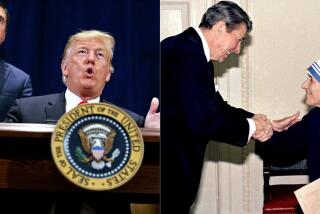Bush Must Accentuate the Dukakis Negatives
- Share via
WASHINGTON — If any one set of numbers sums up George Bush’s problem, it may be this: The conservative Democrats and independents who voted 2-1 for Ronald Reagan in 1984 are now supporting Michael S. Dukakis by almost the same 2-1.
The turnaround is even more incredible when you consider how positive the political environment is, or ought to be, for Bush: seemingly widespread prosperity; the most popular incumbent since Franklin D. Roosevelt blessing his vice president and a world increasingly at peace--new countries line up almost weekly to put down their arms. Yet the polls seem to agree that most Americans do not want Bush to be their President. What’s a fella to do?
“Jim Baker, come on down.” Enter James A. Baker III, former everything and current Treasury secretary. While Baker’s political skills will be a welcome addition to the campaign, a shake-up on top will also help the perception game. Baker’s ascension to the high command will provide a nice departure point for the press heading into the Republican convention. There will be the usual flurry of high-level meetings, followed by the “unveiling” of a new strategy.
Two parts of the “Baker reforms” are predictable. One is to aim the Republican Convention toward four days of heavy Duke-bashing. The other is to make a surprise pick from among the vice presidential choices. Bush is so far behind that the predictable choices won’t do enough. A guess would be to look for Rep. Jack Kemp of New York or Sen. Nancy L. Kassebaum of Kansas as the decision draws near.
Baker can also be expected to take control of coordination between the White House and the Bush campaign. Statements from the White House will probably never again undercut or counter something said by the Bush people. The Administration and the campaign staff will instead appear as a well-synchronized whole. Baker’s strength is in playing the message game with finesse.
The only problem with this is that Bush needs more than Baker--he needs Joan of Arc, specifically a nasty Joan of Arc. Baker’s talent in past Reagan campaigns was to emphasize the positive in his candidate. Alas, polls make clear that in Bush’s case “this dog won’t hunt.” There simply are not enough votes for Bush to elevate the vice president to the front office. He needs to combine his base with votes against Dukakis. Baker’s real test will be framing a negative campaign against Dukakis.
Compared with 1984 or, better yet, 1980, the obstacles are far greater. In 1984, the Republicans had the majority they needed in the pro-Reagan votes of their base. In 1980, the GOP could combine its base with anti-Carter votes, using big I-catching targets--inflation, Iran, interest rates. This year, Dukakis inherits neither Carter’s negatives nor the same number of votes against him.
So this year the Republicans can’t run a “feel good” 1984 race because consolidating their voting base will leave them short of a majority. They can try the 1980 model, but without Dukakis showing Carter’s negatives it will be tougher to do. What’s left is a more subtle attack.
Deftly using Reagan, Republicans can identify with the negative feelings that swing-voters harbor toward Democrats in three areas of potential importance:
Weak defense . But as tensions ease in the world, and procurement scandals rise, this produces diminishing returns.
Tax increases . A good issue thanks to the recent Massachusetts tax rise, but not likely to match in importance its 1984 link to Walter F. Mondale.
Modern morality . On top of the triad is the “Big Mo,” as Bush might put it, issues loosely defined as moral bankruptcy. From the view of social conservatives, these include Democratic support for 1960s life styles, the negatives of Jesse Jackson’s alleged ultraliberalism, softness on crime and opposition to capital punishment. These can of course all blow up in a candidate’s face. If not done through innuendo and a deft balancing act, these attacks can sound perilously close to racism or fundamentalist preaching. And a party that began its 1980 presidential campaign in Philadelphia, Miss.--a few miles from the graves of three murdered civil-rights workers--has seldom shown much subtlety in its use of racially charged symbols.
If Baker can bring this off, he deserves to be secretary of state.
More to Read
Get the L.A. Times Politics newsletter
Deeply reported insights into legislation, politics and policy from Sacramento, Washington and beyond. In your inbox twice per week.
You may occasionally receive promotional content from the Los Angeles Times.










